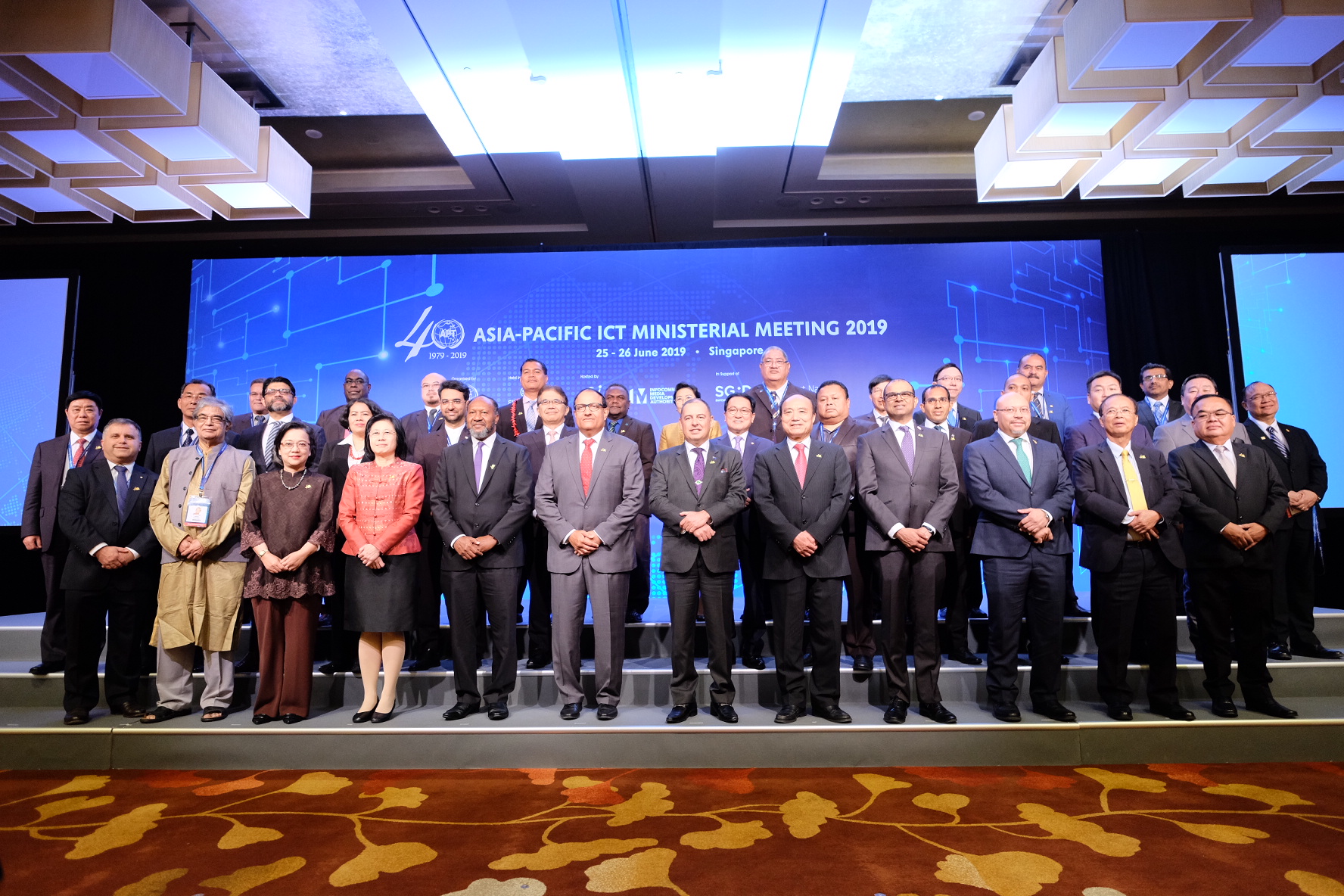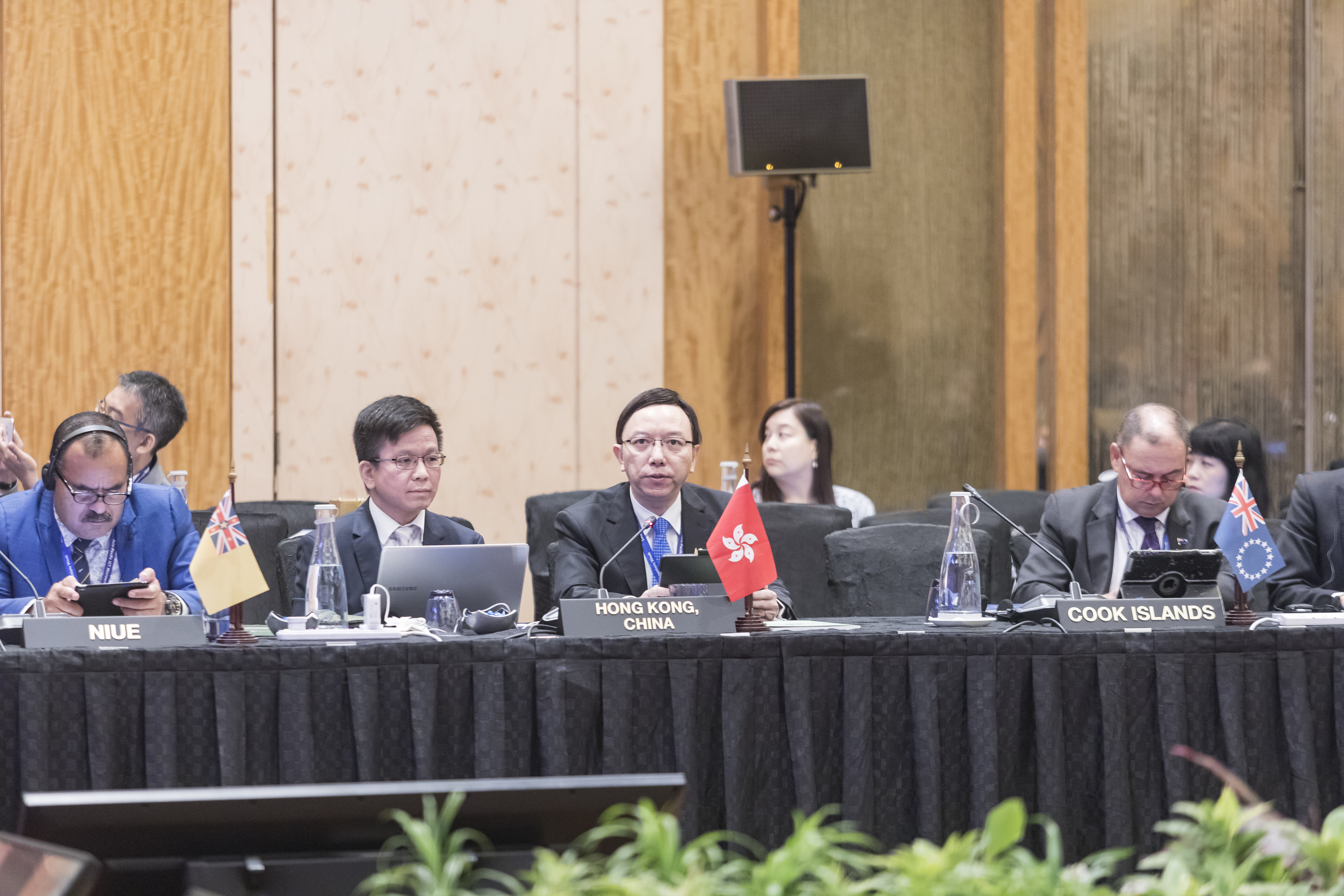Statement by Mr. Victor Lam, JP, Government Chief Information Officer, at the Asia-Pacific Telecommunity “Asia-Pacific ICT Ministerial Meeting 2019” (with photos)
Good morning, excellencies, distinguished guests, ladies and gentlemen,
It is my great pleasure joining the Asia-Pacific ICT Ministerial Meeting 2019 today to give you an update on how Hong Kong, China is making use of ICT for digital transformation and innovation.
The Smart City Blueprint for Hong Kong
Like other economies, the Government of the Hong Kong Special Administrative Region (“HKSAR”) is committed to developing Hong Kong into a world-class smart city. We published the Smart City Blueprint for Hong Kong (“the Blueprint”) in December 2017 to promote digital transformation in many different walks of life and bring greater convenience and comfort to our daily lives.
Electronic Identity (“eID”)
Whilst Hong Kong has already established an advanced, sophisticated ICT infrastructure in particular the telecommunications network, it is imperative for us to invest further in providing the digital infrastructure required to underpin smart city development. To facilitate wider use of on-line transactions and related applications by the community as a whole, we are going to provide an electronic identity (“eID”) for all Hong Kong residents free of charge starting from mid-2020. Not only will it allow our residents to use a single digital identity to conduct government and commercial transactions online, we believe the eID will facilitate the development of innovative services, enabling digital transformation of both public organisations and commercial entities in Hong Kong, especially the small and medium enterprises (“SMEs”) which can save their efforts and investment in developing their own electronic authentication system.
Adopting New Technologies
Similar to other APT Members, the Government of the HKSAR is keen to adopt emerging technologies, including artificial intelligence (“AI”), big data, blockchain, Internet of Things (“IoT”), to improve our public services. These technologies present enormous opportunities for digital innovation and creativity to help drive smart city development. For instance, we have been making use of big data analytics for detection of copyright infringing activities on the Internet. We are also exploring use of video analytics technology for monitoring abnormal behaviours and acts of indiscipline of persons in custody.
To stay in pace with the digital transformation taking place in different governments around the world and achieve economies of scale, we are revamping the government cloud infrastructure and implementing a Big Data Analytics Platform for shared use among government departments. These platforms will expedite delivery of quality public services and facilitate wider adoption of AI and big data among government departments.
Riding on these platforms, we are developing a chatbot for our government one-stop hotline services (“1823”) in answering public enquiries. We will also provide a chatbot service on our government one-stop GovHK portal to facilitate the public to search and access e-Government services.
We are also extending the use of blockchain from trade-finance to other public services. We are implementing several pilot projects to explore the applicability, benefits and limitations of adopting blockchain in the areas of intellectual property protection, company registration, environmental protection and public health.
Realising the potential of IoT for city management, we are taking forward a Multi-functional Smart Lampposts Pilot Scheme to facilitate collection of real-time city data, such as those related to weather, environment and traffic, through IoT devices to enhance city management and other public services. Around fifty smart lampposts are now in operation and more will be installed in various districts in Hong Kong.
Fostering Industry Creativity and Regional Co-creation
Fostering business and industry creativity is key to developing a digital economy. To this end, the Government of the HKSAR formulated a new Open Data Policy last September requiring government departments to open up more public data in machine readable formats on our Public Sector Information Portal (“data.gov.hk”) for free use by the public. These open data will provide raw ingredients for the industry and academia to conduct research and develop digital innovations and smart city applications.
Regional collaboration also fosters co-creation of innovations. The “Outline Development Plan for the Guangdong-Hong Kong-Macao Greater Bay Area” promulgated by the Central People’s Government of People’s Republic of China in February 2019 has tasked Hong Kong, China to play a leading role in several sectors, including financial services, trade, transport, aviation as well as innovation and technology. The Greater Bay Area is expected to rise as an international innovation and technology hub, connecting the region's upstream, midstream and downstream sectors. And that can expand the opportunities for Hong Kong, China – and the companies that work with us, including those from APT member economies.
Last but not least, cyber security is another key pillar of digital economy, especially in this ever-increasingly interconnected world. The Government of the HKSAR has been actively participating in the major global and regional computer emergency incident response organisations, such as the Forum of Incident Response and Security Teams (“FIRST”) and the Asia-Pacific Computer Emergency Response Team (“APCERT”). This enables the timely and efficient sharing of cyber threat information and enhance collaborative responses to combat cyberattacks.
Ladies and gentlemen, let me finish by congratulating APT on its 40th anniversary. Since its inception 40 years ago, APT has been playing an irreplaceable role in offering a free, open and collaborative platform for Members to share experience and cooperate with each other on ICT development. Having been an Associate Member since the APT’s establishment, Hong Kong, China will continue to collaborate and exchange with other Members to co-create a digital future for the Asia-Pacific region.
Thank you.
- ENDS -







